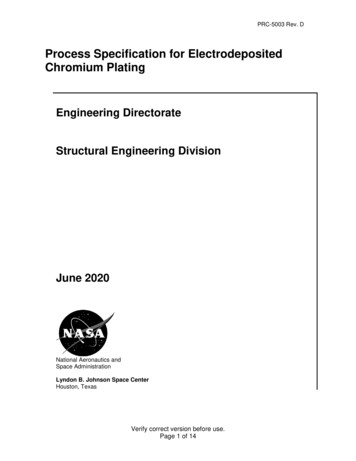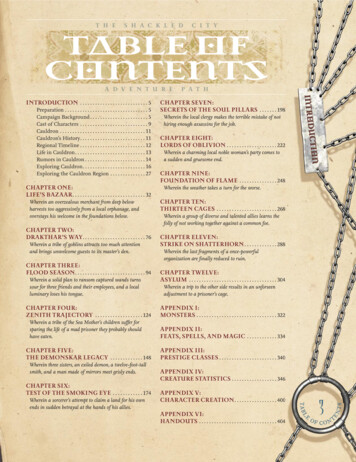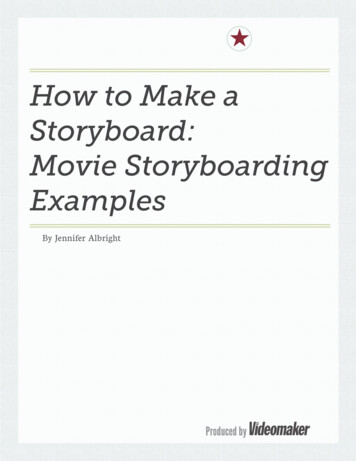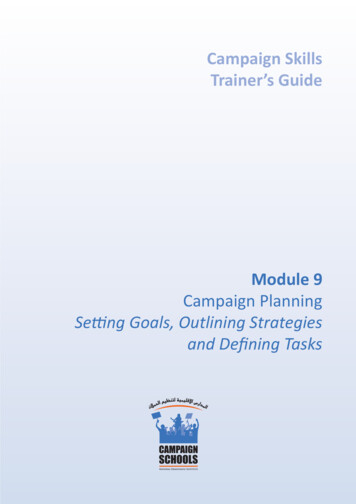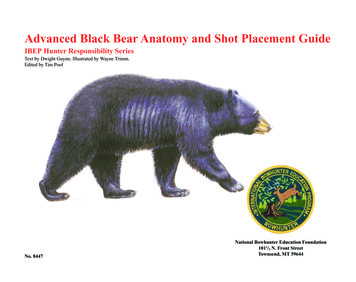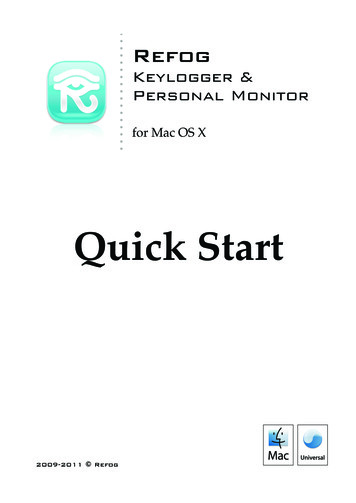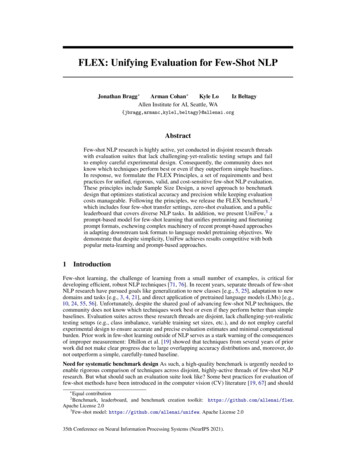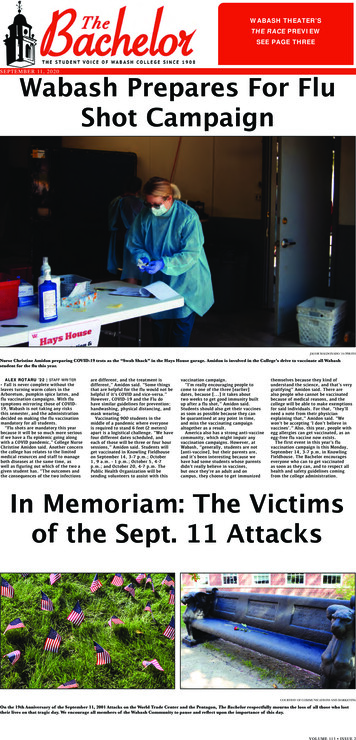
Transcription
WABASH THEATER’STHE RACE PREVIEWSEE PAGE THREEWabash Prepares For FluShot CampaignAUGUST 30,11,2019SEPTEMBER2020COURTESY OF COMMUNICATIONS AND MARKETINGPresident Feller looks to continue the dialogue on the topic of racial inequality, yet understands that dialogue is not enough ifwe want to make systematic changes.JACOB MALDONADO ‘24/PHOTONurse Christine Amidon preparing COVID-19 tests as the “Swab Shack” in the Hays House garage. Amidon is involved in the College’s drive to vaccinate all Wabashstudent for the flu this year.ALEX ROTARU ’22 STAFF WRITER Fall is never complete without theleaves turning warm colors in theArboretum, pumpkin spice lattes, andflu vaccination campaigns. With flusymptoms mirroring those of COVID19, Wabash is not taking any risksthis semester, and the administrationdecided on making the flu vaccinationmandatory for all students.“Flu shots are mandatory this yearbecause it will be so much more seriousif we have a flu epidemic going alongwith a COVID pandemic,” College NurseChristine Amidon said. Another concernthe college has relates to the limitedmedical resources and staff to manageboth diseases at the same time, aswell as figuring out which of the two agiven student has. “The outcomes andthe consequences of the two infectionsare different, and the treatment isdifferent,” Amidon said. “Some thingsthat are helpful for the flu would not behelpful if it’s COVID and vice-versa.”However, COVID-19 and the Flu dohave similar guidelines for prevention:handwashing, physical distancing, andmask wearing.Vaccinating 900 students in themiddle of a pandemic where everyoneis required to stand 6 feet (2 meters)apart is a logistical challenge. “We havefour different dates scheduled, andeach of those will be three or four hoursessions,” Amidon said. Students willget vaccinated in Knowling Fieldhouseon September 14, 3-7 p.m.; October1, 9 a.m. - 1 p.m.; October 5, 4-7p.m.; and October 20, 4-7 p.m. ThePublic Health Organization will besending volunteers to assist with thisvaccination campaign.“I’m really encouraging people tocome to one of the three [earlier]dates, because [.] it takes abouttwo weeks to get good immunity builtup after a flu shot,” Amidon said.Students should also get their vaccinesas soon as possible because they canbe quarantined at any point in time,and miss the vaccinating campaignaltogether as a result.America also has a strong anti-vaccinecommunity, which might impair anyvaccination campaigns. However, atWabash, “generally, students are not[anti-vaccine], but their parents are,and it’s been interesting because wehave had some students whose parentsdidn’t really believe in vaccines,but once they’re an adult and oncampus, they choose to get immunizedthemselves because they kind ofunderstand the science, and that’s verygratifying” Amidon said. There arealso people who cannot be vaccinatedbecause of medical reasons, and thecollege will be able to make exemptionsfor said individuals. For that, “they’llneed a note from their physicianexplaining that,” Amidon said. “Wewon’t be accepting ‘I don’t believe invaccines’.” Also, this year, people withegg allergies can get vaccinated, as anegg-free flu vaccine now exists.The first event in this year’s fluvaccination campaign is this Monday,September 14, 3-7 p.m, in KnowlingFieldhouse. The Bachelor encourageseveryone who can to get vaccinatedas soon as they can, and to respect allhealth and safety guidelines comingfrom the college administration.In Memoriam: The Victimsof the Sept. 11 AttacksCOURTESY OF COMMUNICATIONS AND MARKETINGOn the 19th Anniversary of the September 11, 2001 Attacks on the World Trade Center and the Pentagon, The Bachelor respectfully mourns the loss of all those who losttheir lives on that tragic day. We encourage all members of the Wabash Community to pause and reflect upon the importance of this day.VOLUME 113 ISSUE 2
Most IconicMasks of AllTimeBatmanDREW BLUETHMANN ‘22 CAVELIFEEDITOR The world changed radicallythis spring when the CDC beganrecommending wearing facemasksto mitigate the spread of COVID-19.Although many seem to think thatmasks are not “manly,” masks have aprominent place in our culture and arequite popular.We use masks as art, as disguiseDarth VaderPHOTO COURTESY OF BATMAN-NEWS.COMBatman in The Dark Knight.Batman’s cowl is by far the mostfamous example of superhero disguises.Any actor who puts it on becomes theand as a way to become somethingelse other than oursleves. There arecountless masks that have made theirway into popular culture, includingin sports culture, political culture,and internet culture. Here is TheBachelor’s list of the top 4 most iconicmasks of all time, in no particularorder. Remember to wear your maskand hope that you look as good as this.PHOTO COURTESY OF STARWARS.COMDarth Vader in The Empire Strikes Back.“Caped Crusader,” a shadowy vigilanteand outlaw who seems to watch manyfriends die.LeBatmanDarth Vader’s helmet is as silly as itis terrifying. But five-year-old me, andtwenty-one year-old me always gets a littleuneasy when he cuts through a flock ofrebel soldiers at the beginning of A NewHope. Why is his forehead so big,though?Guy FawkesPHOTO COURTESY OF SBNATION.COMPHOTO COURTESY OF ONEPETERFIVE.COMLeBron James, pregame, wearing his Batman-like facemask.A common mask of Guy Fawkes Face, made famous by the film V for Vendetta.On February 27, 2014, LeBron had31 points and went 13-19 from thefield. He also had one of the mostAnti-State Ideologs love to use amask that looks like Guy Fawkes’sface. Really, he was just an angryiconic dunks of his career. After thegame,the NBA banned black facemasks. . seems suspicious to me.Catholic who wanted to kill King Jamesand the parliament because they wererepressing Catholics. Too bad he failed.From the Ramsay Archives: Chapel Sing19413 WABASHCOLLEGEBACHELOR.COM THE BACHELORCOURTESY OF RAMSAY ARCHIVESFreshmen of the class of 1945 on the steps for Chapel Sing. Note that theyare all bareheaded, holding their Rhynie Pots in their hands and showing duerespect to Dear Old Wabash. Printed on the front page of The Bachelor onSeptember 9, 1941.
OPINIONAUSTIN HOOD ’21EDITOR-IN-CHIEFREED MATHIS ’22NEWS EDITORALEX ROTARU ’22OPINION EDITORBLAKE LARGENT ’22SPORTS EDITORDREW BLUETHMANN ’22CAVELIFE EDITORBENJAMIN HIGH ’23PHOTO EDITORCOOPER SMITH ’23ONLINE EDITORJOHN WITCZAK ’21COPY EDITORIt’s Okay to vote BlueJakobGoodwin ‘23Reply to this editorial atjmgoodwi23@wabash.eduMy biological grandfather onmy mother’s side is a formerlaw enforcement officer.He’s never voted for a Democrat. Mymamaw’s husband is a veteran. He’snever voted for a Democrat. My dad is asmall business owner. To my knowledge,he’s never voted for a Democrat. All inall, my family is pretty conservative,save for the democratic socialist auntand uncle I have. I go to a church wherethe vast majority of the people wouldvote for a Republican mop before theywould vote for a Democrat. And for aslong as I can remember, I consideredmyself a Republican.But not this year. I’m voting forJoe. Why? It is not that I’m some biggovernment authoritarian who wantsto see the nationalization of industryor single payer healthcare or the GreenNew Deal. I don’t. But I’m votingblue because the Republican party isno longer a party for conservatives.The Republican Party is just as biggovernment as the Democratic Party.Instead of single payer healthcare,the GOP wants to spend almost atrillion dollars on defense. Rather thannationalizing the College Board, theright wants to give airlines billions atthe onset of a pandemic rather thanhelping fund a stimulus package.The right defends Trump as he vaguelybribes world leaders to investigate hisenemies but turns a blind eye when herecognizes the severity of COVID-19 butrefuses to wear a mask. And the GOPrefuses to say anything, as the presidenthas turned Attorney General Bill Barrinto his own personal lawyerand fixer. He meddles in cases wherehis friends and employees are involved.All of this while sending DHS troopsto suppress protesters in cities likeMinneapolis, Portland, and Chicago.Do I think Joe Biden will be anamazing president? No. Is he mypreferred option? No. Under any othercircumstance, would I vote for him?No. But if I’m looking for a smallergovernment where the president doesn’tact like a king? There seems to beone option. And that’s okay. VotingDemocrat once doesn’t make you less ofa small government conservative. Butvoting Republican this one time does.How to KnowLiamGrennon ‘24Reply to this editorial atwkgrenno24@wabash.eduWhat is the point of a Wabasheducation? Through anacademic lens, and at therisk of sounding pretentious, it is tofurther each of our individual pursuitsof knowledge. But how does it do that?How do we actually learn? How do we,as individuals, navigate learning newthings in a community?As philosopher Agnes Callard puts it,drawing a conclusion that dates back toSocrates, knowing requires both thatwe believe truths and that we avoidbelieving falsehoods. In other words, mypursuit of learning requires that I haveto decide what to believe and what todismiss. As Callard shows, William Jamesfirst argued that these two goals arenot just different, but incompatible. If Iam only focused on finding the truth, Iwon’t accept the same ideas as someonewho is only avoiding falsehoods. In manycases, I can’t be one-hundred percentsure that something is true. I make ajudgment based on my calculation ofrisk. And it follows that if I’m absolutelycommitted to avoiding falsehoods, Imay well end up deciding not to believeanything at all.Let’s say that we want to think aboutif we have free will or if purely physicalcauses determine our actions. If I amsingle-mindedly pursuing truth, I wouldbe comfortable with saying we all havefree will, because I think that there is agood chance that the statement is true. Ihave to take this risk, because, withouttaking risks in what I believe, I won’t beable to accept anything as true. On theother hand, if someone else is singlemindedly working to avoid falsehoods,they wouldn’t be ok with taking thatrisk. Trying to avoid falsehoods impliesthat, unless you are absolutely sure ofsomething, you should suspend judgmentand not work off an assumption.In “The Will To Believe”, WilliamJames argues that we need to decidewhen to seek truth and when to avoidfalsehoods on a case by case basis.Never taking risks in our beliefs becausewe are scared of accepting a falsehoodwill never let us accept anything. Incontrast, always accepting everythingthat is just likely true leads to believingthings that aren’t true. He thus arguesthat we should use context to decidewhich way we approach potentialbeliefs, and in some circumstances seektruth and in others avoid falsehood.Professor Keller disagrees with thismethod, because, without following bothrules, we can’t know. Following one rulein one instance while following the otherin another instance doesn’t yield actualknowledge. In order to gain knowledge,I can’t just ignore one of those rules.Keller puts forth the idea that it is ratherthe Socratic method that provides thesolution to this problem. By havingtwo opposing sides, each focused on aspecific rule, we can pursue knowledgetogether. She uses the example of alegal dispute in a courtroom. The goalof a trial is to bring about justice. Twoelements are required to realize thisgoal: the prosecutor is solely focusedon convicting the defendant, while thedefense attorney is focused on acquittingthe defendant. Together and onlytogether do they find justice.The value of a Wabash educationlies here. Only through collaboration,and more specifically through playingdifferent roles within the classroom, dowe gain knowledge. A part of the Wabashmission is to “think critically,” whichmeans being able to play either of thoserequired roles to learn — being cautiouswith those beliefs we take responsibilityfor or pushing ourselves to take risks inwhat we think of as truths. Classes hereare designed to foster discussion, whileprofessors encourage disagreementand cultivate our ability to put intoplay opposing rules: both the rule ofharsh and thorough critique and that ofintellectual daring and risk-taking. EachWabash man is expected to participatein the classroom so that we mightundertake the necessarily collectivepursuit of knowledge and knowing.That culture is one that can’t be foundeverywhere, and it makes Wabash aneffective place to learn and grow.The Argument for HumanismAlexRotaru ‘22Reply to this editorial atarotaru22@wabash.eduThis is a response to CalebDickey’s opinion piece, “Whyall this has happened,” fromSeptember 4, 2020.Religion – nothing has brought asmuch hope and misery at the same time.We’ve had people find peace in it duringthe hardest times, we’ve discriminatedagainst people based on religion (thinkMuslims in America), and we’ve hadpeoples fight one another because ofreligious differences (e.g. the Crusades).However, while religion may play animportant part in some people’s lives, Imust object to Mr. Dickey’s idea that wecannot have morality without religion,as morality can become central to asecular society through Humanism.I must clarify that religion is notuseless; in fact, it is useful to have,especially for when Humanism fails,through lack of buy-in or otherwise.There will always be people opposing anypoint of view, so having an alternative ismore than desirable.However, morality can and does existoutside of religion. I genuinely believethat humans can act morally withoutreligion. You might say that people lieand cheat, but that is actually the exactreason I believe in Humanism – ourselfishness is what leads to morality.Allow me to explain.I will start with Thomas Hobbes’ ideathat mankind is selfish, and that humanscan potentially live in a world whereeveryone is at war against the other.However, in this kind of world, peoplecannot benefit from their rights, as theyhave to invest time and energy defendingthemselves from the other. And, so,in order to ensure mutual benefits,humans sacrifice certain rights in orderto be able to benefit from the ones thatremain. This is, in a nutshell, the core ofthe Social Contract theory.Humanism works similarly: becausemankind is selfish, people will naturallyseek maximum benefit for themselves.They could take it from one-another,seeing the world as a zero-sum game,or as a competition, but that would onlysend people closer to their original waragainst the other, and create a longterm need for defending against thosefrom whom one took. Alternatively, theycould work in such a way that benefitsall parties, thus creating a symbiosisthat only strengthens the SocialContract, while providing more rightsand safety for all. Through symbiosis,people are able to help themselves byhelping others, as well as create a betterenvironment whose benefits circle backto them. This is basically how secularWestern Europe functions withouthaving to rely on religion.However, Humanism requiressymbiosis to work. And this is why,as much as I hurt from saying this,Mr. Dickey’s opinion is actually theunavoidable truth for a large portion ofAmerican society. The American mindsetis that life is a competition – you arelikely familiar with terms like “the ratrace” –, and that there are only winnersand losers. This kind of culture will notbe able to foster symbiosis, and, so,there needs to be an effective surrogatefor it. This is where religion comes in, soI am not surprised to see that America isas religious as it is today.In spite of all that, there is hope.Indianapolis tech companies arefostering symbiosis to create aprofessional environment with one ofthe greatest opportunities for careerdevelopment. In Crawfordsville, Wabashinitiatives like the CIBE and WDPD areworking with community partners tohelp develop companies and communitiesin need, while also providing studentswith real world experience, and thecollege with prestige. One might evensay that symbiosis is at the core of theMidwestern lifestyle.In sum, there is a way to maintainmorality in a secular society, bycultivating an environment and aculture where helping others results inhelping oneself. We are selfish, and wecan’t avoid that, so why not use thatselfishness to our own advantage?THE BACHELOR WABASHC OLLEGEBACHELOR .C OM 3
NEWSClint Smith to Visit for PDSSCOURTESY OF DAVIDSON.EDUClint Smith’s virtual visit will focus on “Reinvorating Our Conversation on Why Black Lives Matter”AUSTIN HOOD ’21 EDITOR-IN-CHIEF As a response to the flaring of racialtensions in the United States followingthe deaths of Ahmaud Arbery, BreonnaTaylor and George Floyd (amongothers) this year, the Wabash Collegeadministration has made a concertedeffort to address the topic of systemicracism. This has taken a number offorms, including official statementsand Chapel Talks. This week, Wabashwill host an event to continue thatconversation.On Wednesday, September 16,The College will kick off this year’sPresident’s Distinguished SpeakerSeries with a virtual visit from theacclaimed writer Clint Smith III. Smithhas been asked to “Reinvigorate OurConversation on Why Black LivesMatter.”“Mr. Smith is an acclaimed poet,historian, and journalist, who wasnamed to Forbes ‘30 Under 30’ list,”said Chief of Staff Jim Amidon ‘87.“He is the author of Counting Descent,a collection of poems, and is a staffwriter at The Atlantic. Prior to hisvirtual visit, we encourage everyoneto take just nine minutes to watchtwo short TED Talks (‘How to Raise aBlack Son’ and ‘The Danger of Silence’)to have a sense of why this is such anexciting opportunity for all of us atWabash.”A New Orleans native, the 32-yearold Smith has made a name for himselfas a writer, essayist and poet. Hegraduated from Davidson College in2010 and earned a Ph.D. in educationfrom Harvard University this spring.In addition to his writing, he currentlyteaches writing and literature at theD.C. Central Detention Facility.Smith has earned a number ofaccolades for his work, includingfellowships from the Art for Justice andthe National Science Foundation. Heis the 2014 champion of the NationalPoetry Slam and received the JeromeJ. Shestack Prize from the AmericanPoetry Review in 2017.“The College is delighted to haveClint Smith visit, even if it has tobe virtual,” Dean of ProfessionalDevelopment and Director of theMalcolm X Institute of Blakck StudiesSteven Jones ‘87 said. “Given thedemand for him, we as a communityshould be even more grateful to hearhis voice and perspective on race.”The President’s DistinguishedSpeaker Series was established in 2017through funding provided throughthe Giant Steps Campaign. Previousspeakers include US Senator MikeBraun, New York Times CrosswordEditor Will Shortz and humorist DavidSedaris. Smith was invited to speak atThe College on account of his eleganceand power in writing about issues ofrace in America.“America is at a crossroads,” saidJones. “Each of us must determine ifwe plan to be an agent of change orif we will quietly sit on the sideline.The question is simple: Are you apart of the problem or solution. I amhopeful that Smith will inspire thecommunity to engage and move usto action by being more respectful ofour differences, extending a helpinghand to the least of these and trulyliving humanely with our words andbehaviors.”Feller Holds Listening Sessionat Malcom X InstituteCOOPER SMITH ‘23 EDITOR-INCHIEF In the last month, yet anothervideo of police shooting an unarmedBlack man went viral. It shows anofficer in Kenosha, Wisconsin shootingJacob Blake seven times in the back.The video is an addition to a seriesof jarring incidents caught on camerain the last year that have sparked anational reckoning on race and led to arevitalization of the Black Lives Mattermovement in America.As the world watched and protestserupted, President of the College ScottFeller cancelled his appointments onThursday, August 27 to spend a at theMalcolm X Institute of Black Studiesto listen to the concerns of studentsand faculty. The Bachelor spoke withPresident Feller about what he tookaway from his conversations that day.“Some of the themes I heard werefrom students of color – that they wantto hear direct support from collegeand peers,” Feller said. “It’s not theirjob to teach majority students – thatlearning is on all of us.”Feller seemed to take this themeto heart. He mentioned sitting inon a course and reading works fromBlack authors as part of his educationprocess. Feller pointed to theupcoming Clint Smith virtual eventthrough the President’s DistinguishedSpeaker Series as an excellentopportunity for students interested inlearning about this movement and itswidespread implications.Feller was surprised and excited tohear the extent of student involvement5 WABASHCOLLEGEBACHELOR.COM THE BACHELORCOURTESY OF COMMUNICATIONS AND MARKETINGPresident Scott Feller standing with Steven Jones ‘87, Dean of Proffesional Development and Director of the Malcom X Institute of Black Studies.President Feller cleared his calendar last week to talk to students and facultyabout the events in Kenosha, Wisconsin.in the Black Lives Matter movement,which erupted in large-scale protestsacross the world following the deathsof George Floyd and Breonna Taylor atthe hands of policeover the summer.“I realized something I hadn’tthought of: We’ve had many studentsparticipating in Black Lives Matterrallies over the summer,” Feller said.“That wasn’t on my radar before,and I think we could have some greatconversations on campus about it.”Feller expressed his desire to seemore student-led conversation aboutstudent activism and protest both oncampus and off.“There are lots of students whowant to learn – and they want to learnright now, in this moment,” he said.“In the end, I was really glad I choseto do it. There was a good mixtureof students and faculty, individualand group discussions, and studentsof color and majority students.”Feller expressed his wish to continuethis conversation all over campus,acknowledging that genuine listeningleads to action.“I’d like to see some more listeningevents,” Feller said. “What does ourcampus need? What tactics?”If we, as Wabash, genuinely wishto respond to the crisis around us – ifwe wish to be a home for all Wabashmen – we need to continue thisfruitful,important conversation.
CAVELIFEMindfulness Mondays OfferCalm in the StormREED MATHIS ’22 NEWS EDITOR In our new normal, we as a campus arecontinuing to find ways to balance ourcommunity’s safety and still allow foropportunities for all students to be activeon campus. Whether it be Chapel Talks,Chapel Sing, or holding events on theMall, we are continuing to adapt and showresilience to the restrictions and reality ofwhat campus will have to look like for theforeseeable future. The idea for a weeklyMindfulness Monday on campus has beenchampioned by Jamie Douglas, Directorof the Wabash College Counseling Center,for a couple of years. “We were actuallygoing to start the week we came backfrom spring break last semester, but forobvious reasons, we were not able, and sothis semester, I was determined one wayor another that we were going to do it,”Douglas said.The idea for having Mindfulness Mondaycame from Douglas’ extensive work intherapy and consultation over the yearsand because it is apparent what the twobiggest detriments to Wabash men are:stress and anxiety.“The biggest worries we get in theCounseling Center are students’ beingstressed or anxious, and mindfulnessreally addresses both of them,” Douglassaid. Especially during the pandemic, weneed to find ways to address students’constant stress both inside and outside theclassroom. The counseling center is findingnew ways to combat these new sources ofconcern, led by Mindfulness Monday’s.“I took an online course throughKripalu Center for Yoga and Health inMassachusetts this April called the Riseand Resiliency Program. It focused onaddressing the struggles folks with traumaand PTSD, and for Wabash, we have youngpeople who are still learning to managetheir emotions, learn to manage stress,and continuing to mature,” said Douglas.Not only is Douglas at the forefrontfor the event, but the newly appointedStudent Development and WellnessCoordinator, Ryan Dobbs ‘03, is providinghis services, as he has a background incounseling and emotional regulation. “Iwas just going to do this myself, but afterour first session, Ryan expressed interestin leading one of the sessions. Not only didhe offer to lead the second session, but Ithink this is an opportunity for the guyson campus to get to know him better,”Douglas said. As of right now, they arealternating on who leads the groups, withDouglas set to direct for next Monday’ssession.Led by its students’ voices and actions,the stories and struggles with mentalhealth are becoming more normalizedand another facet of why the Wabashbrotherhood continues to strive forward.For the last six months, researchersand Douglas both point to the fact thatindividuals are often situated in their“fight or flight” way of thinking and thatthis presents an issue for all of us, bothin the short and long-term. “We are nowstuck in this hyper vigilant state andour brain is telling us there is a crisisall the time. We are not able and meantto live in that space of our brain forextended periods. It is not sustainable,”Douglas said. Now through a quarter ofthe semester - yes, you heard that right,we are coming to grips with the addeddemands classes and extracurriculars bringto all of us daily. With the entire studentbody having free and seamless accessto the Counseling Center, MindfulnessMondays create another dimension forWabash students to attenuate stress andbe around other people.“Originally, I was going to have theseevents in the Chapel, but after talking tomy husband (Dr. Douglas), he shared howmuch he wanted us to do it outside so otherpeople can see it in action. Also, for guysto stay active outside of their rooms andin the process, finding some new pals,”Douglas said. The sessions change everyweek, and for instance, next Monday’s willconsist of walking meditation.Concerned about finding time in yourschedule? Don’t. These sessions are onlyfifteen minutes and are offered up untilthe end of the semester. And instead of7:00 AM, like Douglas would prefer, it isbetween 12:40 PM - 12:55 PM on the Mallnear the Chapel steps. “You should be ableto get your lunch, you can even bring itbefore things get going, and you will haveplenty of time before classes start in thePHOTO COURTESY OF BACHELOR ARCHIVESJamie Douglas, Director of the Wabash College Counseling Center.afternoon. Also, you allow yourself tocenter your thoughts before kicking offthe rest of the week,” Douglas said.With all of us not knowing whatthe next day, let alone the next week,will entail, these sessions allow fora consistent, stable opportunity forstudents to take advantage and takecontrol of their day-to-day life at Wabash.“I think it only takes seven minutes a dayof mindful meditation for 3-6 months toalter the make-up of the brain, and notonly is that super cool, but it improvesone’s ability to act compassionately andempathetic towards those around us,”Douglas said.The more participants involved in thesessions, the higher their effectivenesswill be. All parties stand to win with eachadded student attending these sessions.The Race to Premiere NextWeekLIAM GRENNON ’24 STAFF WRTIER As the last signs of summer fade into fallaround campus, we approach the openingof Wabash’s first production of the year.Like many things around campus, thisyear’s performance will look a littledifferent than years prior. Aside fromhappening virtually, The Race will bring anew type of production to campus. For thefirst time, the Theater department will bedebuting a style of improvisational theatrecalled playback theater to the Wabashstage.“The Race was originally written for the2008 election, investigating what it meansto be a leader through playback theater,”Senior cast member Paul Hawsenmeyertells us.Paul worked with Professor WintersVogel and others this summer to try andfigure out how to pull off a performancelike this virtually.He talked about the opportunity theoriginal script gives to the cast, describingit as “constantly changing and evolvingto let our personal voices and opinionsbe heard,” Senior stage manager DannyCuevas added that, “each performancewill be different because of the rolethe audience plays.” With the 2020presidential election approaching, TheRace “really gives the audience and cast anopportunity to think about what we lookfor in those who hold office, and the stateof political affairs in America today.” saidCuevas.The play focuses mostly on theleadership and character of politicalcandidates while remaining impartial.Hawsenmeyer describes it as “aninvestigation into where the world isright now, without being partisan andantagonistic.” He describes the role of thecast to be “active listeners and presentboth guidance and ideas back to theaudience.”Playback Theatre is a form ofimprovisational theatre where theaudience shares personal opinions andexperiences and watches them enactedback to them on stage. The Race tells astory while leaving space and opportunityto hear from the audience. The cast thenplays out their responses on stage. Theplay has three acts, the first “Investigateswhat it means to be a politician and thedifferent roles they present to people.The second and third acts how we thenrespond to those candidates, as well ashow we respond to the world at large.”says Hawsenmeyer “In many ways, thisis not a traditional play, it requires alot of the audience. If you are a fan ofWDPD on campus or deliberation, this isdefinitely the play for you,” adds Cuevas.“Because there is space for the audienceto add input, each night will be a differentperformance,” Cuevas continued.Changes around campus in response tosocial distancing concerns have meanttaking rehearsals online, which hascreated a unique new set of hurdles toovercome. “The job of the stage manager
"Caped Crusader," a shadowy vigilante and outlaw who seems to watch many friends die. From the Ramsay Archives: Chapel Sing 1941. COURTESY OF RAMSAY ARCHIVES. Freshmen of the class of 1945 on the steps for Chapel Sing. Note that they are all bareheaded, holding their Rhynie Pots in their hands and showing due . respect to Dear Old Wabash.
